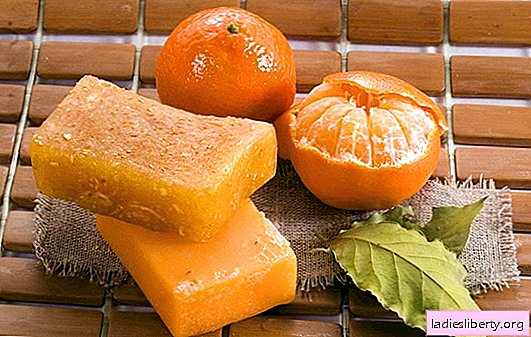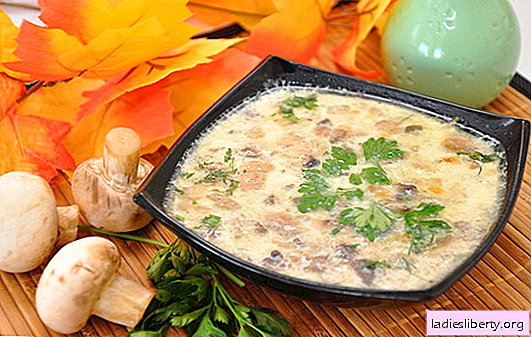
Soap made at home can be a true masterpiece of needlework.
Preparing it yourself is not at all difficult, and the process itself is addictive with its fascination.
In addition, any individually useful ingredients, favorite perfumes and desired colors can be added to such a soap.
Soap recipes at home for beginners are simple and fun. And mastery of certain rules will help to avoid the most common mistakes.
Soap at home: how it differs from the purchased
Home soap has a great advantage over what is on the shelves of supermarkets. The composition of the purchased soap is often monotonous, and the list on the packaging is always subject to great doubt. As a rule, the soap purchased in the store dries the skin, tightens it, leaves a plaque.
And only home-made soap at home will possess all the qualities that a certain type of skin requires. Soap recipes at home for beginners do not require any unusual ingredients. Everything you need for an exciting soap making can be purchased in specialized stores.
Cooking soap at home, into it you can add essential oils and herbal decoctionsthat fill it with a lot of useful properties.
So, for example, soap with tea tree oil or calendula broth Ideal for washing oily skin prone to rashes. It will have a disinfecting effect.
Fir As part of a soap bar, it will relieve a pustular rash.
Soap with orange will help in the fight against cellulite and energize.
If to add to soap lavender essential oils, it is ideal for evening hygienic procedures, soothes and attunes to pleasant dreams.
When preparing soap at home, you can add any essential oil to it. This will give it both beneficial properties and a favorite aroma. Essential oils do not have fats that could clog pores. The main thing is not to exceed the permissible number of drops, because this can provoke allergic reactions.
Buying in a store soap scrub, one often doubts that it included natural particles that will remove dead skin cells. But if the manufacturer replaced them with a synthetic analogue, then the skin will suffer from such a chemical effect. A homemade soap with a scrubbing effect will not only perfectly cope with its task, but will also heal the skin. Useful oatmeal is usually added to such a soap as a gentle but effective scrub. Ground coffee in soap will help to arrange a real body peeling, but it does not injure it. In the soap-scrub, you can also add any cosmetic clay and decoctions of herbs.
Soap will be able to rejuvenate the skin and moisturize it. seaweed in the process of cooking. Initially, the soap base can be diluted with milk or herbal decoctions, which will also beneficially affect the condition of the skin.
The recipe for an invigorating refreshing soap at home for beginners includes menthol. The secret of such a soap is to completely dissolve the menthol crystals. To do this, in the initial stage, alcohol is used instead of water. Only alcohol will completely dissolve menthol, evenly distributing it throughout the soap base.
Reflecting on what to present to relatives and friends for the next holiday, soap made at home will be one of the best options. After all, it can be made not only extremely useful, but also beautiful. To give beautiful shades, you can use as natural dyes - coffee, fruit, vegetable, berry juices. So are dyes sold in specialized stores. In addition, dry flower buds, pieces of chocolate and other useful and beautiful ingredients that only imagination can look beautifully look in pieces of soap.
Making soap at home (for beginners): what is needed for this
Before embarking on the fascinating process of making homemade soap, you need to get all the ingredients, auxiliary items, and utensils:
• Soap base - it is sold in specialized stores, it is white and transparent. But for beginners of soap making it is better to use a simple baby soap;
• Water, decoctions of herbs, milk - to dilute the soap base;
• Base oil - olive, grape, almond, apricot. Any of these and other oils can be purchased at the pharmacy;
• Essential oils - they will give the finished product the desired flavor and beneficial properties;
• Glycerin;
• Additives - they are selected, taking into account the purpose of the future soap: moisturizing, scrubbing, healing, soothing, tonic, etc.
• Dyes - the soap can, of course, be transparent, in which herbs, flowers, zest of citrus fruits will be clearly visible. And if not, then dyes are used that are purchased at the store or prepared personally from natural materials;
• Utensils - containers for a steam bath device, as well as various molds for soap, which can be either specialized or any plastic, glass or ceramic forms;
• Alcohol - it will be needed to degrease the molds for soap and to get rid of bubbles.
Homemade Soap Recipe for Beginners: Ingredients and Procedure
The recipe for soap at home for beginners is quite simple and it is a pleasure to do this. When everything you need is at hand, it's time to start cooking:
1. We arrange on the stove a water bath of medium intensity;
2. Rub the baby soap on a coarse grater or cut into pieces the soap base and place in a water bath so that the base melts;
3. In the process of melting the base, you need to add oil to it, which plays a basic role. Take 3 tablespoons per 100 g of soap base;
4. At the same time, add water, milk or decoctions of herbs to the resulting mixture. This should be done gradually to get a creamy consistency;
5. Remove the completely melted mixture from the water bath and add essential oils (not more than 5 drops per 100 g of product), dyes and ingredients, if desired, and a teaspoon of glycerin;
6. Dosed pour future soap into molds that have previously been rubbed with alcohol;
7. To get rid of the bubbles on the surface of the soap, it must be sprinkled with alcohol from a fine spray;
8. Leave the molds with the mixture in a cool place for several days.
After 2-3 days, the mixture in molds will harden and completely dry. That's the whole soap recipe at home for beginners. From the first attempt you will get an amazingly useful soap that will delight not only its manufacturer, but also those with whom he will share his masterpiece.
Making soap at home: the main problems of beginners
It is common for everyone to make mistakes, and especially in such a creative process as soap making. But in order not to translate the ingredients so often, it’s useful to know some rules that will help to avoid misses.
The soap recipe at home for beginners should be well studied, and all the components are pre-prepared at hand. But besides this, you need to accurately calculate the dosage of each of the additives:
• To prepare a soap mixture is possible only in a water bath. If you do this directly in a container on fire, then everything just starts to burn;
• Additional components are added to the slightly cooled mixture;
• Do not use the mixer for mixing, this will lead to a large number of bubbles;
• For 100 g of soap base, take no more than 3 tablespoons of base oil. Otherwise, the finished soap will not be washed;
• Base oil is not added if a clear soap is expected;
• Essential oils must be added dropwise, not exceeding a total of 5 drops. Otherwise, it is easy to provoke an allergic reaction caused by an overdose of esters;
• When preparing soap for children, adding essential oils is not at all worth it;
• Poorly milled grass or its excessive addition will unpleasantly scratch the skin. The same applies to coffee, oatmeal, and everything else that is usually used for scrubbing soap;
• Flowers and herbs are added only in dry form;
• Additives for scrub soap are best added when the soap mixture is already poured into molds. This will allow particles to linger evenly throughout the soap bar;
• If salt is added in the process of soap making, the mixture will decompose into components and cooking will be interrupted and the product will be spoiled;
• You can only make figures from a still very warm soapy mixture. If it cools, it will begin to disintegrate when trying to twist something from it;
• Of natural dyes, only beetroot juice is able to color the product red;
• Colors and smells should not be mixed already in the process of soap making, as the result may be unpredictable and not the most pleasant;
• In the process of preparing a multi-layer soap, the surface of each previous layer must be slightly cut and sprinkled with alcohol;
• Alcohol must be clean, it must not be replaced with vodka or other alcohol-containing liquids;
• In the refrigerator, the molds with soap can be no more than 10 minutes;
• Soap forms should not be exposed to dry in the open sun.
These basic rules will help you avoid the most common soap making mistakes, guided by soap recipes at home for beginners. In addition, one should make it a rule to write down every successful recipe and never rely solely on memory.













